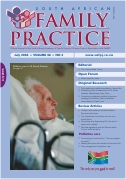Making Decisions with Families at the End of Life
Abstract
Because advance directives are not yet the norm, end-of-life decisions for patients without medical decision-making capacity are made regularly within discussions between the patient’s physician and family. Communication and decision making in these situations require a complex integration of relevant conceptual knowledge of ethical implications, the principle of surrogate decision making, and legal considerations; and communication skills that address the highly charged emotional issues under discussion. The most common pitfalls in establishing plans of care for patients who lack decision-making capacity include failure to reach a shared appreciation of the patient’s condition and prognosis; failure to apply the principle of substituted judgment; offering the choice between care and no care, rather than offering the choice between prolonging life and quality of life; too literal an interpretation of an isolated, out-of-context, patient statement made earlier in life; and failure to address the full range of end-of-life decisions from do-not-resuscitate orders to exclusive palliative care. (Copyright© 2004 American Academy of Family Physicians.) SA Fam Pract 2006;48(6): 24-29 Permission from the AAFP was granted to publish this article in the hardcopy only. Kindly refer to www.aafp.org or subscribe to the hardcopy of South African Family Practice.
Issue
Section
CPD
By submitting manuscripts to SAFP, authors of original articles are assigning copyright to the South African Academy of Family Physicians. Copyright of review articles are assigned to the Publisher, Medpharm Publications (Pty) Ltd, unless otherwise specified. Authors may use their own work after publication without written permission, provided they acknowledge the original source. Individuals and academic institutions may freely copy and distribute articles published in SAFP for educational and research purposes without obtaining permission.

